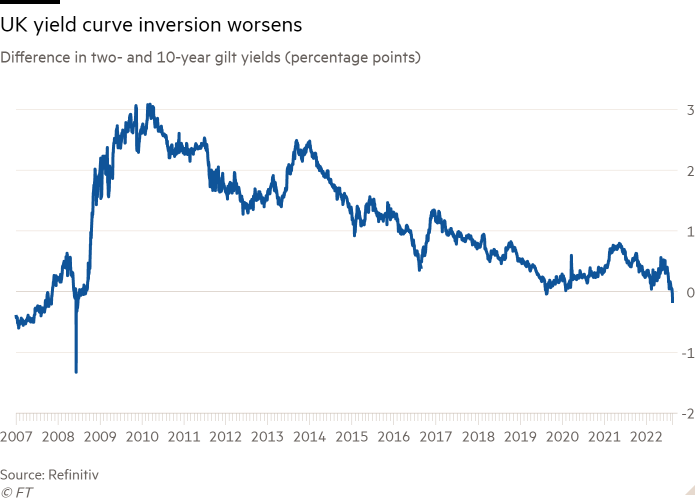Short-term UK government bonds sold off sharply on Wednesday as blistering inflation data lifted expectations for Bank of England rate rises, sending a measure of concern over Britain’s economic outlook to the highest level since 2008.
Two-year gilt yields, which are sensitive to expectations for monetary policy, soared 0.24 percentage points in morning action to 2.39 per cent. Longer-term bonds came under softer selling pressure, with the 10-year yield rising 0.11 percentage points to 2.23 per cent.
The moves left two-year yields trading more than 0.15 percentage points above their 10-year counterparts, the biggest “inversion” of Britain’s yield curve since the 2008 global financial crisis.
James Athey, investment director at Abrdn, said the sell-off in two-year bonds “is telling us the market thinks the bank rate needs to go higher”.
He added that “the reality is positioning has exacerbated this a lot . . . [due to] the not particularly hawkish stance of the Bank of England and the notion of a peak inflation stance”, where those who believed that the UK had already hit peak inflation were now selling their holdings on fears of a situation worse than expected.

Investors typically demand higher borrowing costs for the risk of buying bonds maturing long into the future, meaning yield curves normally slope upward.
An inverted curve is a sign that investors are expecting the BoE will need to increase interest rates sharply in the near term to tame inflation, something that is expected to trigger a contraction in future economic output.
Following data on Wednesday that showed UK consumer prices climbed at an annual rate of 10.1 per cent in July — the highest inflation rate in more than 40 years and greater than economists’ consensus forecast — traders are now expecting 2 percentage points of BoE rate increases by May next year, with traders expecting a 0.5 percentage point increase at the next BoE meeting in September.
A day earlier, markets were pointing to 1.6 percentage points of rate rises.
The central bank has already increased its main interest rate from 0.1 per cent in November 2021 to 1.75 per cent this month.
“Unless wage growth and hence underlying inflationary pressures moderate on their own without a rise in unemployment, UK policymakers are stuck between a rock and a hard place,” said Mike Bell, global market strategist at JPMorgan Asset Management.
For all the latest Business News Click Here
For the latest news and updates, follow us on Google News.
